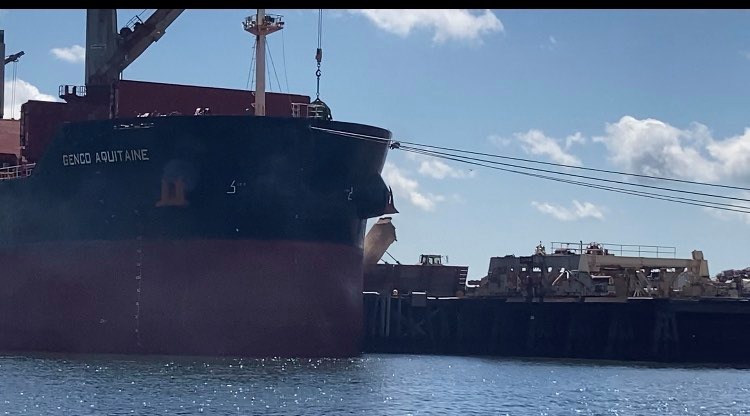Community
Former Somerset scrap metal facility agrees to pay $300,000 amid dust, noise, and stormwater allegations

BOSTON – The owner and operators of a former Somerset scrap metal facility have agreed to pay a total of $300,000 to settle allegations that they illegally discharged industrial stormwater into Mount Hope Bay and emitted dust and noise pollution into the surrounding environment, disrupting the lives of residents in Somerset’s Brayton Point neighborhood, Attorney General Andrea Joy Campbell announced today. If approved, the majority of the settlement will fund projects to improve the area’s access to and enhance the water quality of Mount Hope Bay.
Pending approval by the U.S. District Court for the District of Massachusetts, the consent decree will settle allegations that the facility’s operators, Eastern Metal Recycling Terminal, LLC and Patriot Stevedoring and Logistics, LLC, and the property’s owner, Brayton Point, LLC, violated the federal Clean Water Act, the federal Clean Air Act, and the Massachusetts Clean Air Act by discharging industrial stormwater into Mount Hope Bay without complying with a federal stormwater discharge permit and by regularly emitting excessive dust and noise from the facility.
“I along with the team are proud of this settlement and grateful for the continued advocacy of the residents and their partnership,” said AG Campbell. “This settlement will improve the water quality in Mount Hope Bay and provide the impacted communities with a cleaner and healthier environment. We will continue to take on companies that put the safety and health of our residents at risk”
“The actions of these entities at Brayton Point put the public’s health in jeopardy and contaminated natural resources in Mount Hope Bay and the Taunton River,” said Commissioner Bonnie Heiple of the Massachusetts Department of Environmental Protection (MassDEP). “Today’s announcement underscores our commitment to continue to work closely with residents and with Attorney General Campbell’s office to ensure that our environmental laws are applied in a way that puts our environment and our neighborhoods first.”
“I am grateful to Attorney General Campbell and her team for holding the owners and operators of Brayton Point accountable for the massive disruption they caused to the neighborhood and surrounding communities,” said Representative Pat Haddad (D-5th Bristol). “I am pleased that the AG’s proposed remedy will direct critical funds to projects that will increase access to and enhance the water quality in Mount Hope Bay.”
The scrap metal facility, which ceased operating on March 21, 2022, was located on a peninsula in Mount Hope Bay within 500 yards of a residential community, known as the Brayton Point neighborhood, and was once home to one of New England’s largest coal-fired power plants. After a successful challenge by the Brayton Point neighborhood, the operations shut down after the Massachusetts Land Court held that Brayton Point, LLC was in violation of a town bylaw.
According to the AG’s Office, the defendants’ former operations – including transporting scrap metal materials around the facility with heavy equipment, storing scrap metal piles at the facility, and loading the scrap metal materials onto ships – caused clouds of dust, known as particulate matter, to regularly blow from the facility over Mount Hope Bay and in the direction of the Brayton Point neighborhood. The AG’s Office alleges that the dust from the facility landed on residents’ homes, windows, plants, cars, and other property. According to the AG’s Office the dust disturbed the residents’ everyday lives, causing them in some cases to lose sleep, change plans, stay indoors, and close their windows. The AG’s Office further alleges that several residents, including children, experienced new or exacerbated respiratory problems since the scrap metal facility began operating.
“I am hopeful that this is closure of a really difficult time,” said Kathy Souza, a Brayton Point resident, who successfully advocated for the plant’s closure. “I am very thankful for the residents of the region who fought daily for years for our fundamental rights for clean air and water, and for the Attorney General’s Office for their unwavering support.”
The AG’s Office also alleges in its lawsuit that the defendants’ discharge of polluted industrial stormwater into Mount Hope Bay poses a threat to aquatic ecosystems and was in violation of industrial stormwater permits issued by the United States Environmental Protection Agency. Stormwater pollution is regulated under a variety of federal Clean Water Act permits and is recognized as the largest threat to water quality in the state. Certain industrial facilities in Massachusetts like this one must obtain specific authorization for stormwater discharges, properly monitor and control stormwater discharges, and comply with state water protection laws.
Under the terms of the consent decree, if approved, defendants are required to comply with the federal Clean Water Act and pay $150,000 to the Town of Somerset, $25,000 to the Town of Swansea, and $25,000 to Greater Fall River Re-Creation, a non-profit organization that provides recreation and other programs to the residents in the Greater Fall River area, emphasizing economically disadvantaged youths. The payments are to be used to fund projects that increase access to and enhance the water quality in Mount Hope Bay in the vicinity of the former facility. The settlement also requires the company to pay the state $100,000 to offset the costs of the AG’s multi-year enforcement effort and for future monitoring of the companies’ compliance with the consent decree. The AG’s Office sought and incorporated input from the Brayton Point community on the best use of the settlement funds.
This case was handled by Assistant Attorneys General Nora Chorover and Emily Mitchell Field, of the AG Office’s Environmental Protection Division, with assistance from MassDEP Environmental Strike Force Inspectors Steve Spencer and Tim Dame, as well as Michael Whiteside of MassDEP’s Southeast Regional Office in Lakeville.






You must be logged in to post a comment Login